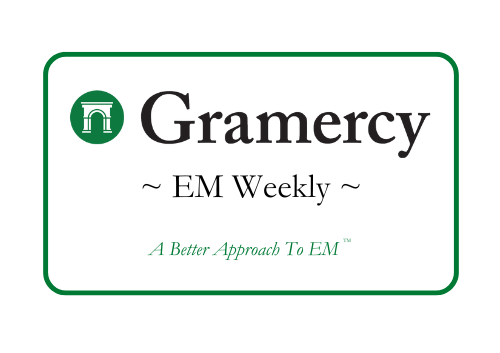Contents
Market Overview
Macro Update
This week, U.S. economic data had a scent of stagflation, adding to concerns about the global economy’s only reliable engine of growth.
On Tuesday, the U.S. saw a 5.8 point drop in consumer confidence, to 98.3, that followed last week’s sub-50 services PMI. It also saw a fall in pending home sales in January to the lowest level on record, negative Dallas Fed Manufacturing Activity data, and higher than anticipated jobless claims. In addition, the decline in fourth-quarter non-residential investment was revised from -2.2% to -3.3%.
Inflation concerns remained elevated, with an upward revision to 4Q core PCE to 2.7% year-over-year, although January PCE data was in line with expectations at 2.5% year-over-year.
U.S. treasury yields fell to their lowest levels so far this year with the 10-year touching 4.22% and saw continued 2s10s curve flattening. Brent dropped around 2% on the week, with DXY strengthening after declining in recent weeks.
Markets digested this data against the backdrop of fluid geopolitical developments.
On Friday, a meeting in Washington between Ukrainian President Volodymyr Zelenskiy and U.S. President Donald Trump devolved into a contentious debate over U.S. support for Ukraine, casting uncertainty over the countries’ relations and a deal to jointly develop Ukraine’s mineral resources. Friday’s spat came on the heels of votes from the U.S. and Russia against a European-backed resolution in the U.N. General Assembly earlier in the week that called out Russia’s full-scale invasion of Ukraine and approved a U.S. resolution for a “swift end” to the conflict.
In the closely watched German elections Sunday, Friedrich Merz emerged as Germany’s Chancellor-in-waiting after winning the largest share of votes (28.5%). Focus now shifts to coalition formation and Merz’s priority to “strengthen Europe as quickly as possible”. The Euro initially extended moderate gains amid speculation over prospects for stronger pro-growth policies before retreating as dollar strength reemerged by the end of the week. On the data front, Eurozone inflation came in line with expectations at 2.5% year-over-year while inflation expectations came in softer than consensus. Consumer confidence edged lower in Germany.
Elsewhere, Korea’s Central Bank delivered a unanimous 25bps cut amid growth concerns with neutral to hawkish forward guidance. In the political arena, a Constitutional Court ruling is expected soon on the motion to impeach President Yoon Suk Yeol.
EM Credit Update
EM sovereign cash bonds returned +0.68% this week while spreads widened by 6bps. Investment grade sovereign bonds outperformed this week, returning +1.07% versus high yield sovereign bonds that returned only +0.32%. On a spread basis, the latter widened 12bps while investment grade sovereign spreads remain relatively unchanged.
EM corporates returned 0.46% while spreads widened by 9bps. Given the move in U.S. rates, investment grade outperformed high yield in the corporate space as well, returning +0.58% versus 0.30% for high yield. On a spread basis, both investment grade and high yield corporates widened by 8bps-10bps.
With a slightly stronger dollar this week, local currency sovereign bonds underperformed, returning -0.41%.
Venezuelan bonds also underperformed as the Trump Administration signaled it would not allow Venezuela oil licenses to automatically renew on March 1st due to the Maduro regime’s lack of cooperation on migration and Venezuela’s election conditions last year.
Saudi Arabia, Paraguay and Kenya came to the market this week alongside seven corporate issuers.
The Week Ahead
Previously announced 25% tariffs on Mexico and Canada are set to go into effect on March 4th unless Mexico and Canada officials reach a new agreement with the U.S. In advance of the deadline, Mexico’s President Claudia Sheinbaum and Economy Minister Marcelo Ebrard have announced progress on drug seizures, a reduction in border crossings, and possible tariffs on countries with which Mexico does not have trade agreements. President Trump announced plans for an additional 10% tariff to go in effect on the same day for China.
U.S. ISM February data will be watched more closely as last week’s soft services PMI raised questions about growth resiliency while productivity, unit labor costs, jobless claims and non-farm payrolls data released later in the week will provide the latest indications for the labor market.
In Europe, key data releases include Eurozone preliminary CPI, unemployment, final Eurozone PMI and retail sales, and U.K. PMI for February while the ECB policy meeting is set for March 6th with expectations for a 25bps cut.
In China, analysts estimate slightly better February PMI data, while the long-awaited annual NPC (National People’s Congress) session will convene and publish its work report on March 5th. We expect an annual growth target of “around 5%”, a higher official deficit to GDP ratio, and an increase in central and local government special net bond financing targets.
Turkey’s Central Bank will release inflation data for February, as well as a rate decision, on March 6th. The market consensus is for a 250bps rate cut. Brazil reports GDP on March 7th.
Fixed Income
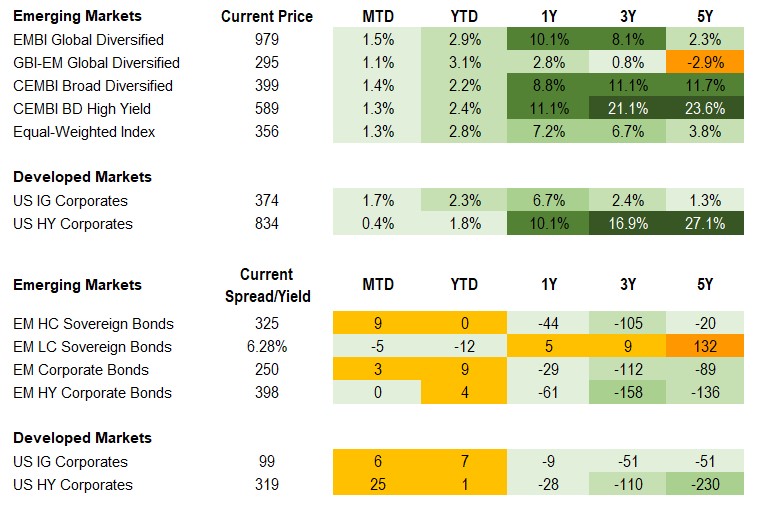
Equities
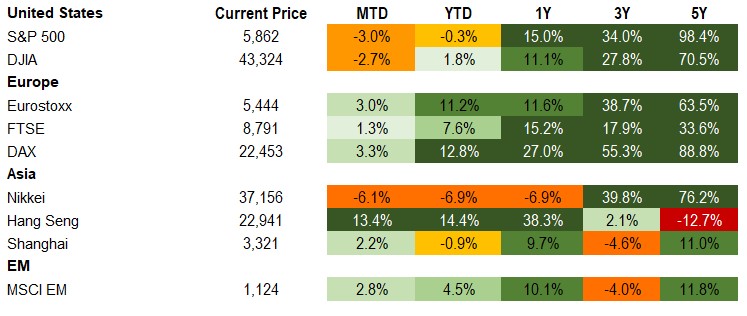
Commodities

Source for data tables: Bloomberg, JPMorgan, Gramercy. EM Fixed Income is represented by the following JPMorgan Indicies: EMBI Global, GBI-EM Global Diversified, CEMBI Broad Diversified and CEMBI Broad High Yield. DM Fixed Income is represented by the JPMorgan JULI Total Return Index and Domestic High Yield Index. Fixed Income, Equity and Commodity data is as of February 28, 2025 (mid-day).
Country Highlights
Trump and Zelenskiy White House Spat Plunges Relations into Further Uncertainty
Event: What was supposed to be a signing ceremony by Presidents Trump and Zelenskiy of a draft agreement on the so called “minerals deal” disintegrated into a public spat in which President Trump accused his guest of disrespecting the United States and “gambling with World War III”.
Gramercy Comment: Friday’s extraordinary events played out in front of the media in the Oval Office and billions of viewers worldwide. President Trump and Vice President J.D. Vance raised their voices with President Zelenskiy as they laid out grievances against Ukraine and their guest, accusing him of disrespect and ingratitude toward the United States.
Following the tense exchanges, President Trump canceled the planned joint press conference with President Zelenskiy and posted on social media that Zelenskiy is not “ready for peace”. The fallout from these unprecedented developments is so far unclear, but likely to be significant and wide-ranging for the future of the Transatlantic relationship as well as for the trajectory of the Ukraine-Russia conflict.
We have been cautioning for weeks against the market’s excessive optimism about the Trump Administration’s ability to engineer a “deal” on Ukraine that would be acceptable to all key stakeholders, so these developments come as no surprise to Gramercy. However, the wider market was negatively surprised; Ukraine’s sovereign bonds’ complex was under pressure after the White House clash, with the macro-linked bonds (MLBs), whose valuations hinge on Ukraine’s medium-term economic outlook, leading the way.
President Trump Says Venezuela Oil Licenses to be Terminated
Event: On Wednesday, President Trump announced that he will not allow Venezuela oil licenses to automatically renew on March 1st due to Venezuela’s leader Nicolas Maduro’s lack of cooperation on migration and Venezuela’s election conditions last year. After a rally in Venezuela and PDVSA bonds for much of this year, bonds partially retraced gains on the news.
Gramercy Comment: The withdrawal of oil licenses is a credit negative. We continue to see migration as a central issue for President Trump and reduced oil flows to Venezuela would likely exacerbate migration flows over time. The most relevant license is Chevron’s General License 41, which last renewed on February 1st for six months. If upheld, the company would be able to continue operating in the country until the end of July. This could provide a window of opportunity for the Maduro regime to accelerate acceptance of deportation flights. It could also allow time for political dealmaking with at least a subset of the opposition and members the regime ahead of regional and legislative elections set for May 25th.
Mexico Growth Slows as Tariff Deadline Nears
Event: Mexico’s growth slowed to 1.5% in 2024 from 3.3% in 2023 with a sequential contraction (-0.6% quarter-on-quarter) in the final quarter of the year, led by primary and secondary sectors. Meanwhile, President Trump reiterated that the tariff deadlines of March 3rd for the currently delayed 25% tariffs on Mexico and Canada, as well as the April 2nd date for reciprocal tariff implementation, remain in effect. Meanwhile, Mexican officials have continued their efforts on migration and security along with reported consideration of tariffs on countries with which they do not have trade agreements. Mexico’s bond yields have moved lower. MXN has been range-bound in contrast to recent broader EM FX strength amid DXY weakness over the month.
Gramercy Comment: We expect growth to continue to ease in Mexico this year, the extent of which will be dependent on the fate of U.S. tariffs and the strength of the U.S. economy. As it currently stands, we see downside risks to the market consensus estimate of 1%. We think recent data on border crossings, fentanyl, and openness to impose tariffs on China bode well for continued near-term reprieve. However, more extensive USCMA negotiations, as well as sector specific tariffs and recent U.S. State Department Foreign Terrorist Organization (FTO) designations of major cartels leave room for a bumpy path to more sustainable deals.
Emerging Markets Technicals
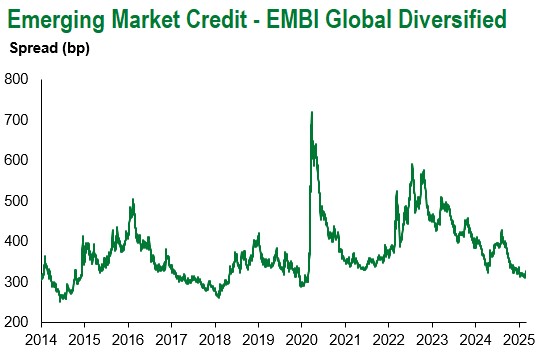
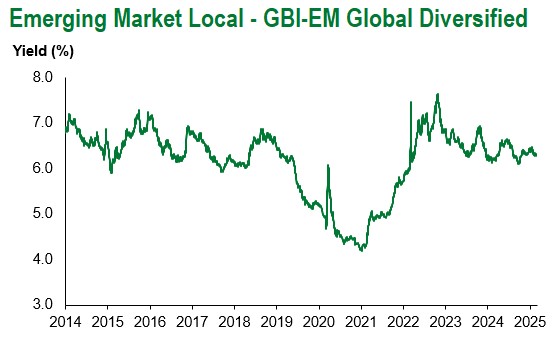
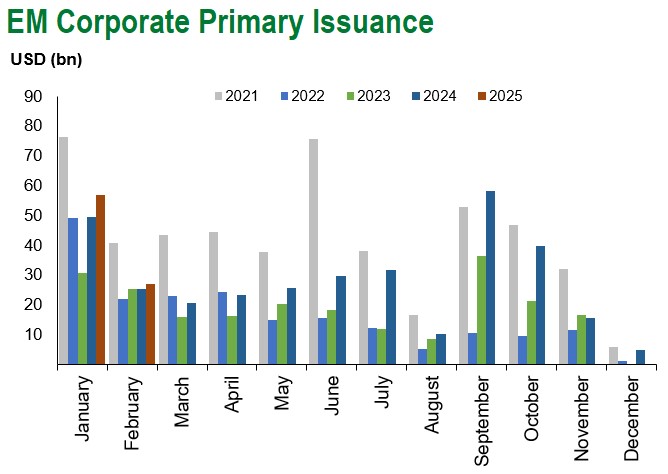
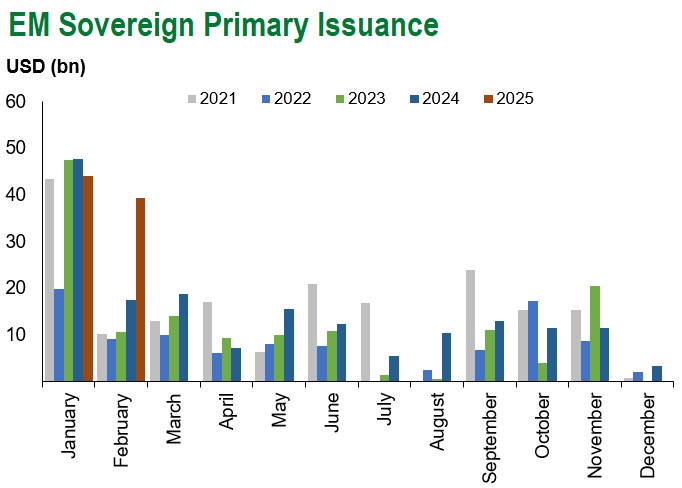
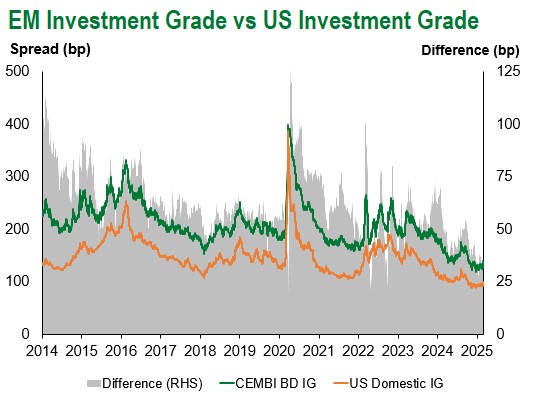
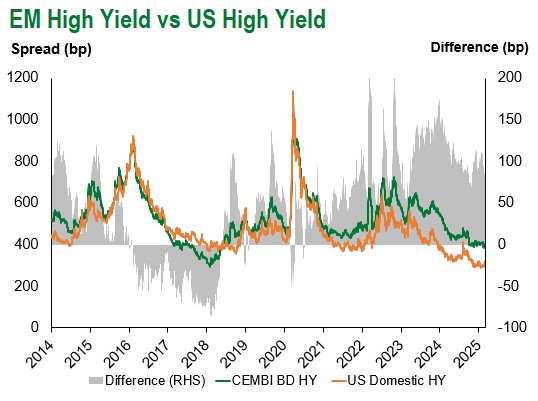
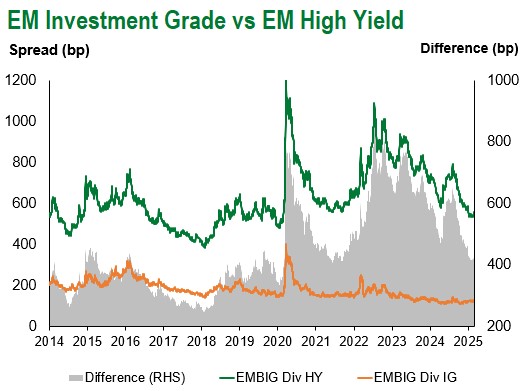

Emerging Markets Flows
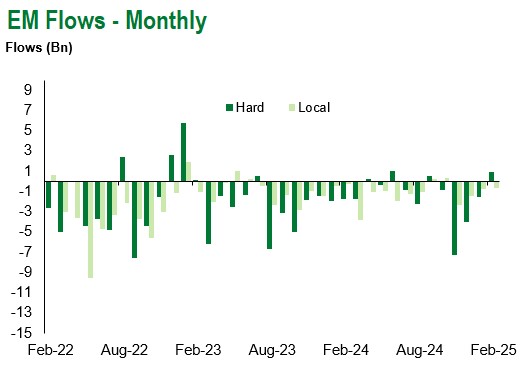
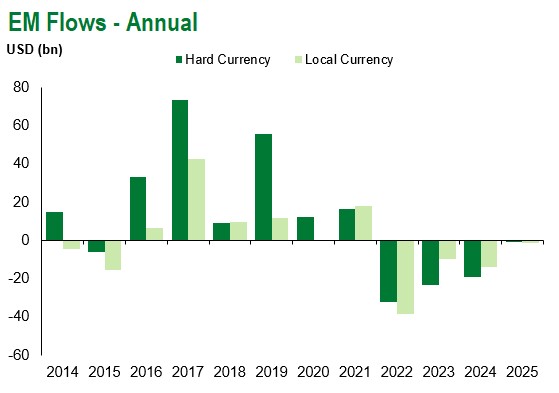
Source for graphs: Bloomberg, JPMorgan, Gramercy. As of February 28, 2025.
For questions, please contact:
Simon Quijano-Evans, Managing Director, Chief Strategist, [email protected]
Kathryn Exum, CFA ESG, Director, Co-Head of Sovereign Research, [email protected]
Petar Atanasov, Director, Co-Head of Sovereign Research, [email protected]
This document is for informational purposes only. The information presented is not intended to be relied upon as a forecast, research or investment advice, and is not a recommendation, offer or solicitation to buy or sell any securities or to adopt any investment strategy. Gramercy may have current investment positions in the securities or sovereigns mentioned above. The information and opinions contained in this paper are as of the date of initial publication, derived from proprietary and nonproprietary sources deemed by Gramercy to be reliable, are not necessarily all-inclusive and are not guaranteed as to accuracy. This paper may contain “forward-looking” information that is not purely historical in nature. Such information may include, among other things, projections and forecasts. There is no guarantee that any forecasts made will come to pass. Reliance upon information in this paper is at the sole discretion of the reader. You should not rely on this presentation as the basis upon which to make an investment decision. Investment involves risk. There can be no assurance that investment objectives will be achieved. Investors must be prepared to bear the risk of a total loss of their investment. These risks are often heightened for investments in emerging/developing markets or smaller capital markets. International investing involves risks, including risks related to foreign currency, limited liquidity, less government regulation, and the possibility of substantial volatility due to adverse political, economic or other developments. References to any indices are for informational and general comparative purposes only. The performance data of various indices mentioned in this update are updated and released on a periodic basis before finalization. The performance data of various indices presented herein was current as of the date of the presentation. Please refer to data returns of the separate indices if you desire additional or updated information. Indices are unmanaged, and their performance results do not reflect the impact of fees, expenses, or taxes that may be incurred through an investment with Gramercy. Returns for indices assume dividend reinvestment. An investment cannot be made directly in an index. Accordingly, comparing results shown to those of such indices may be of limited use. The information provided herein is neither tax nor legal advice. Investors should speak to their tax professional for specific information regarding their tax situation.
